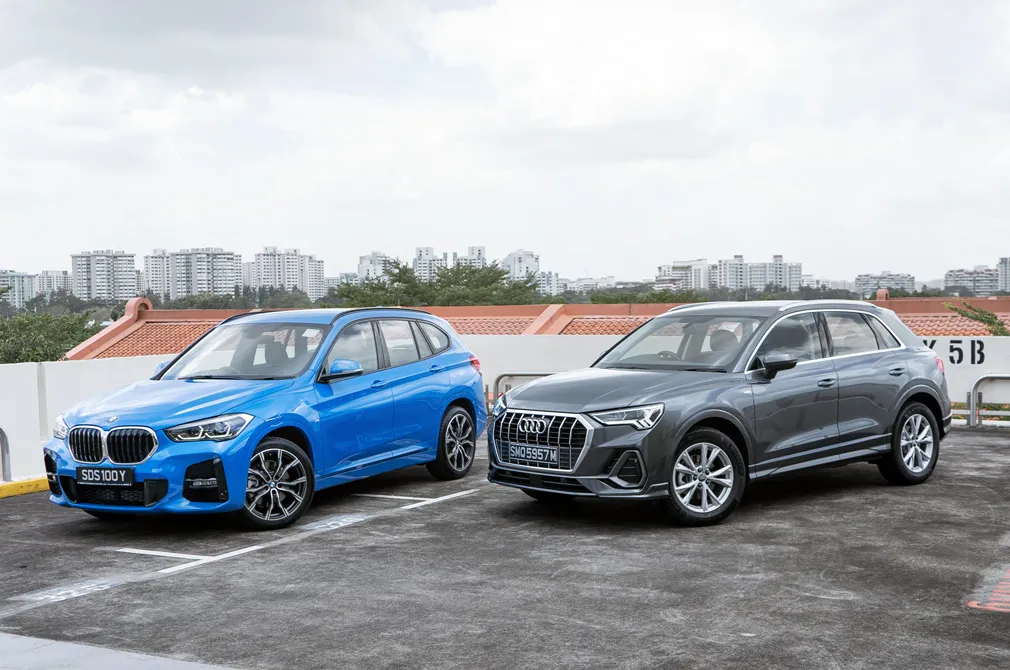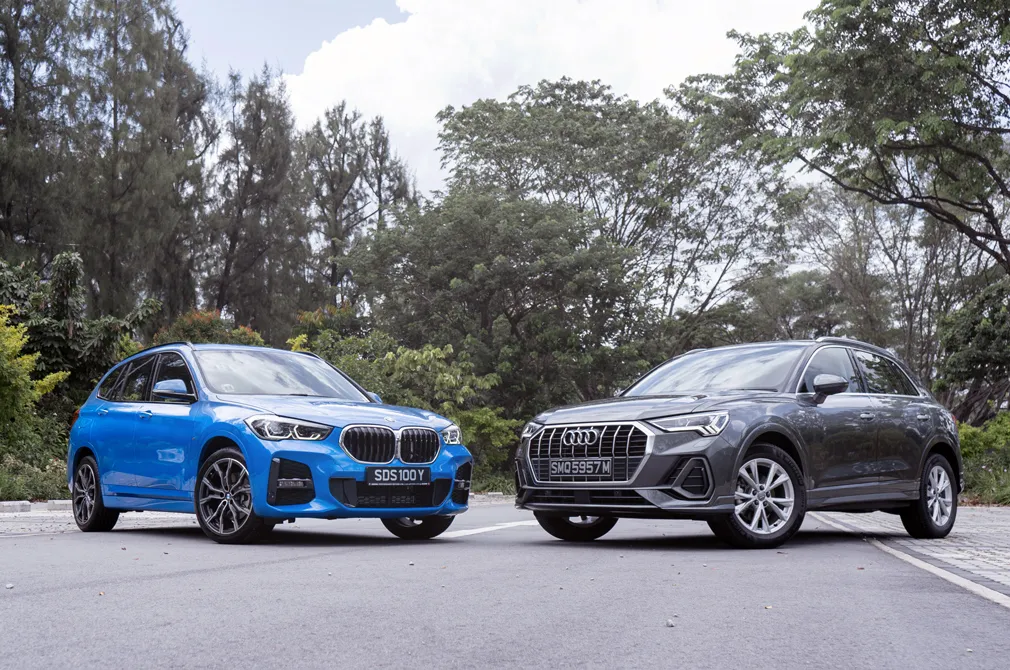BMW X1 vs Audi Q3: Which Premium SUV Is Worth It?

Anúncios
When it comes to compact luxury SUVs, the BMW X1 vs Audi Q3 debate is one of the most hotly contested in the automotive world.
Both vehicles offer a blend of style, performance, and cutting-edge technology, but which one truly deserves your investment?
In this comprehensive comparison, we’ll dive into the strengths and weaknesses of each model, helping you decide which premium SUV aligns best with your needs.
Anúncios
As the luxury SUV segment continues to grow, both BMW and Audi have made significant advancements in their offerings.
This competition drives innovation, ensuring that buyers have access to the latest features and technologies that enhance both driving pleasure and safety.
Design and Styling: A Battle of Elegance and Sportiness
The BMW X1 and Audi Q3 take distinctly different approaches to design.
The X1 leans into BMW’s signature sporty aesthetic, with sharp lines, a bold kidney grille, and an athletic stance that screams performance.
Its interior follows suit, featuring a driver-focused cockpit with premium materials and a minimalist layout.
In addition, the X1’s customizable ambient lighting options allow drivers to personalize their cabin experience, enhancing the overall ambiance.
This attention to detail not only elevates the driving experience but also reflects BMW’s commitment to luxury and functionality.
On the other hand, the Audi Q3 embraces a more understated elegance.
Its exterior is sleek and modern, with a distinctive Singleframe grille and angular LED headlights.
Inside, the Q3 offers a more futuristic vibe, with a dual-screen infotainment setup and ambient lighting that adds a touch of sophistication.
Furthermore, the Q3’s use of high-quality materials throughout the cabin reinforces its luxury credentials, making it feel premium in every aspect.
Table 1: Exterior and Interior Design Comparison
| Feature | BMW X1 | Audi Q3 |
|---|---|---|
| Exterior Style | Sporty, aggressive | Sleek, modern |
| Interior Layout | Driver-focused, minimalist | Futuristic, tech-heavy |
| Material Quality | Premium, tactile | Luxurious, refined |
While the X1 appeals to those who crave a sportier vibe, the Q3 caters to drivers who prioritize a more polished and tech-forward experience.
+ Tesla Model Y vs Ford Mustang Mach-E: Electric Cars Face Off
Performance: Power and Handling Compared
Under the hood, the BMW X1 and Audi Q3 offer different driving experiences.
The X1 comes standard with a 2.0-liter turbocharged inline-4 engine, delivering 241 horsepower and 295 lb-ft of torque.
Paired with a 7-speed dual-clutch transmission, it provides quick acceleration and responsive handling, making it a joy to drive on winding roads.
Additionally, the X1’s sport-tuned suspension enhances its agility, allowing for sharp cornering that enthusiasts will appreciate.
This combination of power and handling makes the X1 a top choice for those who enjoy a spirited driving experience.
The Audi Q3, meanwhile, features a similar 2.0-liter turbocharged engine but produces 228 horsepower and 258 lb-ft of torque.
While it’s slightly less powerful than the X1, the Q3 compensates with its smooth ride quality and precise steering.
Its quattro all-wheel-drive system ensures excellent traction in various conditions, making it a solid choice for those who value stability over outright speed.
Moreover, the Q3’s adaptive suspension available in higher trims allows drivers to switch between comfort and sport modes, tailoring the driving experience to their preferences.
Table 2: Performance Specifications
| Feature | BMW X1 | Audi Q3 |
|---|---|---|
| Engine | 2.0L Turbo Inline-4 | 2.0L Turbo Inline-4 |
| Horsepower | 241 hp | 228 hp |
| Torque | 295 lb-ft | 258 lb-ft |
| Transmission | 7-speed Dual-Clutch | 8-speed Automatic |
| Drivetrain | Standard AWD | Standard AWD (quattro) |
If you’re after a more engaging drive, the X1 takes the lead.
However, the Q3’s balanced performance and refined ride make it a strong contender for daily commutes and long trips.
Technology and Infotainment: Cutting-Edge Features
Both the BMW X1 and Audi Q3 come packed with advanced tech, but their approaches differ.
The X1 features BMW’s iDrive 8 system, which includes a 10.7-inch touchscreen and a 10.25-inch digital instrument cluster.
The system is intuitive, responsive, and supports wireless Apple CarPlay and Android Auto.
Moreover, the X1’s voice recognition technology enhances usability, allowing drivers to control various functions seamlessly while keeping their hands on the wheel.
This integration of technology not only improves convenience but also contributes to a safer driving experience.
The Audi Q3, on the other hand, boasts a dual-screen setup with a 10.1-inch upper display and an 8.8-inch lower touchscreen.
While it looks impressive, some users find the system less intuitive than BMW’s iDrive.
However, the Q3 offers a standard 10.25-inch digital cockpit, which provides customizable displays and crisp graphics.
Additionally, the Q3’s virtual cockpit allows for a more immersive driving experience, displaying navigation and other essential information directly in the driver’s line of sight.
When it comes to driver-assistance features, both SUVs are evenly matched.
Adaptive cruise control, lane-keeping assist, and automatic emergency braking come standard, ensuring a safe and stress-free driving experience.

Space and Practicality: Which SUV Fits Your Lifestyle?
The BMW X1 and Audi Q3 are both compact SUVs, but their interior dimensions reveal key differences.
The X1 offers more rear legroom, making it a better choice for families or those who frequently transport passengers.
Its cargo capacity is also slightly larger, with 25.7 cubic feet behind the rear seats and 58.7 cubic feet with the seats folded.
Furthermore, the X1’s split-folding rear seats provide versatility for transporting larger items, enhancing its practicality for everyday use.
This focus on space and functionality makes the X1 a practical choice for active lifestyles.
The Audi Q3, while slightly smaller, still provides ample space for most drivers.
It offers 23.7 cubic feet of cargo space behind the rear seats and 48 cubic feet with the seats down.
While it may not match the X1 in terms of sheer volume, the Q3’s interior feels more luxurious, with high-quality materials and thoughtful storage solutions.
Additionally, the Q3’s adjustable cargo floor allows for easier loading and unloading, catering to a variety of needs.
++ Chevrolet Onix vs Hyundai HB20: Which Compact Hatchback Reigns Supreme?
Fuel Efficiency and Running Costs
Fuel economy is a crucial factor for many buyers, and here the BMW X1 has a slight edge.
According to EPA estimates, the X1 achieves 25 mpg in the city and 34 mpg on the highway.
The Audi Q3 trails slightly behind, with 23 mpg in the city and 30 mpg on the highway.
This difference in fuel efficiency may not seem significant, but it can add up over time, especially for those who frequently drive long distances.
Moreover, the X1’s efficient turbocharged engine contributes to its overall appeal as a cost-effective luxury SUV.
When it comes to maintenance, both brands offer competitive warranty packages.
However, BMW’s maintenance program covers routine services for the first three years or 36,000 miles, giving the X1 an advantage in terms of long-term ownership costs.
This commitment to customer satisfaction and value adds to the X1’s appeal for potential buyers.

Safety: Which SUV Keeps You Protected?
Safety is a top priority for both BMW and Audi, and the BMW X1 and Audi Q3 are no exceptions.
Both vehicles earned a 5-star overall safety rating from the National Highway Traffic Safety Administration (NHTSA).
Standard safety features include forward collision warning, automatic emergency braking, and blind-spot monitoring.
Additionally, both SUVs incorporate advanced structural designs that enhance crash protection, contributing to their high safety ratings.
This focus on safety ensures that drivers and passengers can enjoy peace of mind on every journey.
The Audi Q3 goes a step further with its available night vision assistant, which uses thermal imaging to detect pedestrians and animals in low-light conditions.
While this feature is impressive, it comes at an additional cost, making the X1 a more budget-friendly option for safety-conscious buyers.
Moreover, the Q3’s array of safety technologies can be tailored to individual preferences, enhancing the overall driving experience.
Pricing and Value: Which SUV Offers More Bang for Your Buck?
The BMW X1 starts at $38,600, while the Audi Q3 has a slightly higher base price of $39,100.
Both SUVs offer a range of optional packages and upgrades, but the X1 provides more standard features for the price, including a larger infotainment screen and a more powerful engine.
This value proposition makes the X1 an attractive option for buyers looking for luxury without compromising on essential features.
Moreover, the X1’s competitive pricing allows for flexibility in choosing additional options to suit personal preferences.
That said, the Q3’s luxurious interior and advanced tech features may justify the higher price tag for some buyers.
Ultimately, the choice comes down to your priorities: if you value performance and practicality, the X1 is the better deal.
If you’re willing to pay a premium for luxury and cutting-edge technology, the Q3 is worth considering.
Verdict: Which Premium SUV Should You Choose?
The BMW X1 vs Audi Q3 comparison highlights two exceptional compact luxury SUVs, each with its own strengths.
The X1 excels in performance, space, and value, making it an excellent choice for drivers who want a sporty and practical vehicle.
The Q3, on the other hand, offers a more luxurious and tech-forward experience, appealing to those who prioritize comfort and innovation.
Ultimately, the decision depends on your personal preferences and lifestyle.
Test drive both models to see which one resonates with you.
Whichever you choose, you’ll be getting a premium SUV that delivers on style, performance, and technology.
By providing a detailed, balanced, and engaging comparison, this article aims to help readers make an informed decision in the BMW X1 vs Audi Q3 debate.
Whether you’re drawn to the X1’s sporty charm or the Q3’s refined elegance, both SUVs represent the best of what compact luxury has to offer.
